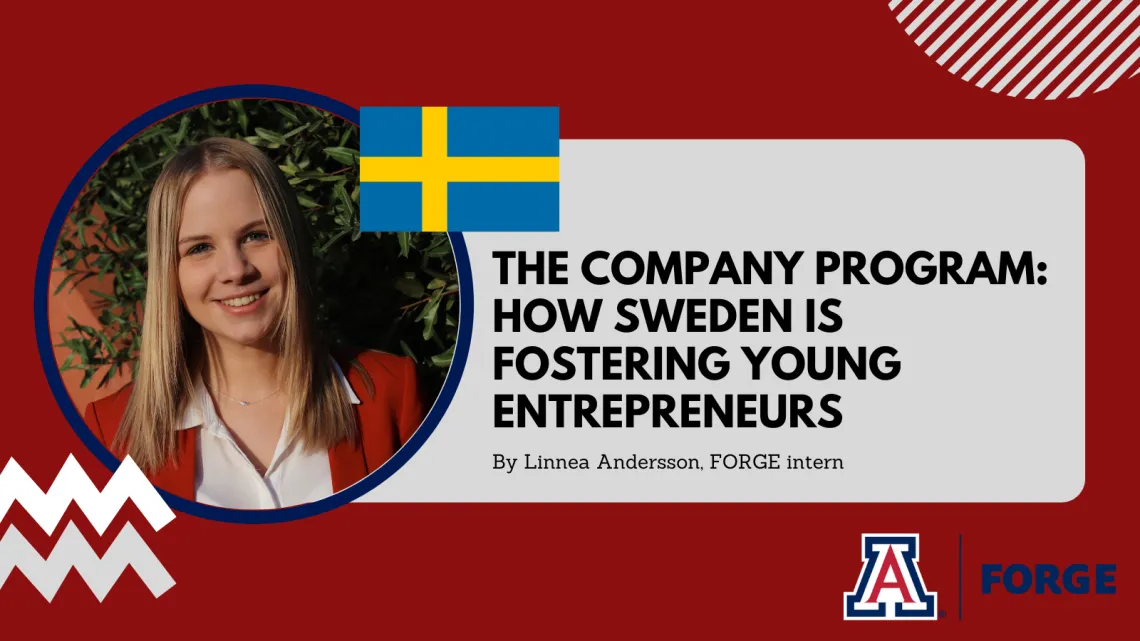The Company Program: How Sweden is Fostering Young Entrepreneurs

At FORGE, we’re all about molding entrepreneurial minds. That can be supplying the “rocket fuel” to the most promising startups (FORGE Ahead), helping would-be founders get their ideas validated and off the ground (FORGE at Roy Place), or providing the kinds of real-world experiences that help today’s students see themselves as tomorrow’s entrepreneurial leaders (FORGE at UA). In November’s Straight from the Hearth, you heard from Shaw Zeider, FORGE’s Student Entrepreneurial Fellow, about the ‘personal startup’ journey. In this month’s edition, it’s time to hear from Linnea Andersson, an international student, and FORGE’s Marketing and Communication Coordinator on some of the differences she’s spotted between her native Sweden and the US. Enjoy!
Linnea here, one of FORGE’s interns. I am writing this issue from my childhood bedroom in Sweden, where I am spending my winter break. I first came to the United States in 2019 to pursue my bachelor’s degree 9000 miles away from the island where I was born and raised. I feel so fortunate to have the opportunity to study abroad, as it has been an extremely rewarding and insightful experience thus far. Today, I’m here to share one of my recent insights with you.
Going home always makes me reflect on the differences between Sweden and the U.S. With my internship at FORGE in mind, my attention this time around was drawn to entrepreneurship, and the different attitudes towards it. My work at FORGE has mainly been focused on FORGE at UA programs, working to inspire and cultivate entrepreneurial thinking in college students. As I now turn my head to Sweden, I realize that the process of cultivating entrepreneurial thinking in youth starts much earlier here.
First of all, the Swedish education system is structured differently from the American one. Upon entering upper secondary school (high school) at 16 years old, we choose a program to enroll in, either vocational or focused on preparing us for college. This program is equivalent to a major and decides our entire curriculum for our last three years of high school. Two of the majors available at every school are the Economics and Technology programs which both include one mandatory and pretty unique class during the senior year. The Company Program allows student teams to create, run, and compete nationally with their very own business venture, called a youth company.
Sound familiar? The program is without a doubt similar to FORGE’s Accelerators and the FORGE At UA student challenges. The one difference is that the Swedish participants are not college graduates or even undergraduates, but high school students. More than 33,000 students each year get a taste of real-life entrepreneurship, and many of their youth companies achieve a revenue of tens of thousands of dollars in the short year of the program. After the year is over, the students have the choice between liquidation or turning their startup into an actual company upon graduating high school.
The advantages later in life for the participating students are undeniable and have been proved through a number of studies. According to one study from 2013, participants of the program had higher lifetime earnings, fewer days of unemployment, and were more likely to become managers than their peers who did not participate in the program. Another study showed that those who ran a youth company in high school experienced immediate benefits, as it developed skills such as teamwork, communication, organization, and even increased self-confidence in a way none of their other classes did.
What this goes to show is that even for students who are not looking to become entrepreneurs, running a business venture can help develop soft skills that high schools might struggle to teach in other ways. For an especially driven high school entrepreneur, this could even mean that they are set to start a profitable, real business straight out of high school.

The Company Program has grown significantly in the past years and in some cities, up to a third of all high school students take part in it. While a majority of students choose not to continue their company after graduation, many find themselves running their own businesses in the future. The creator of Truecaller is one example of a past youth company student turned actual entrepreneur, with an application that in 2020 reached 200 million users. Sweden has been a successful hub for startups in the past decade and Stockholm comes second only to Silicon Valley when ranking the number of billion-dollar tech companies per capita. While this certainly has to do with government policies around taxes and monopolies, fostering young entrepreneurs is also vital to the process, and the Company Program presents an excellent starting point.
The program is funded and organized by Junior Achievement (JA), a global non-profit organization focused on encouraging entrepreneurial thinking in young people. The organization was first founded in the U.S., and according to their website, they have served more than 4.5 million American students thus far. There is an American equivalent of the Company Program, but it seems as though many American high schools choose to teach JA’s theoretical classes rather than offering the hands-on learning program. As a matter of fact, the only mention I could find of the company program in American research was in an article from 1992 where it was established that only 4.5% of the total American JA student population took part in it. This can be compared to Sweden, where 25% of all high school students have the opportunity to take part in the program.
Why are American schools choosing to teach the theoretical parts of JA’s curriculum rather than The Company Program? One explanation could be that the program requires the students to have basic knowledge of topics such as business or engineering, something that in Sweden is part of the participating student’s curriculums prior to starting their business venture. By having a major in high school, Swedish students are able to dive deeper into a subject of their interest, leading them to take part in rewarding real-life experiences towards the end of their high school career.
I wish I could tell you about my own experiences with the company program, but unfortunately, I did not take part in it. Because I was a social science major rather than an economics major, it was not part of my curriculum. While my major did present me with other rewarding, real-life experiences such as an externship at the European Union, I do wish I would have seized the opportunity to participate in the program. The skills it has proven to develop are ones that I am now trying to build myself as I enter my first semester of Eller. It is easy to look back and reflect on missed opportunities, but the truth is that I had no plan of pursuing a business degree when I was in high school. It was not until I took my first college business class that I developed my love for the subject, and now I can’t see myself doing anything else.
I may not have gotten to explore entrepreneurship in high school, but my internship at FORGE has allowed me to make up for that now. Through FORGE, I get to see entrepreneurial thinking in action every single day, and I have learned so much since the start of my internship. I look forward to continuing that learning experience while also helping create opportunities for other students to embark on their entrepreneurial journey through our FORGE at UA events and innovation challenges.

